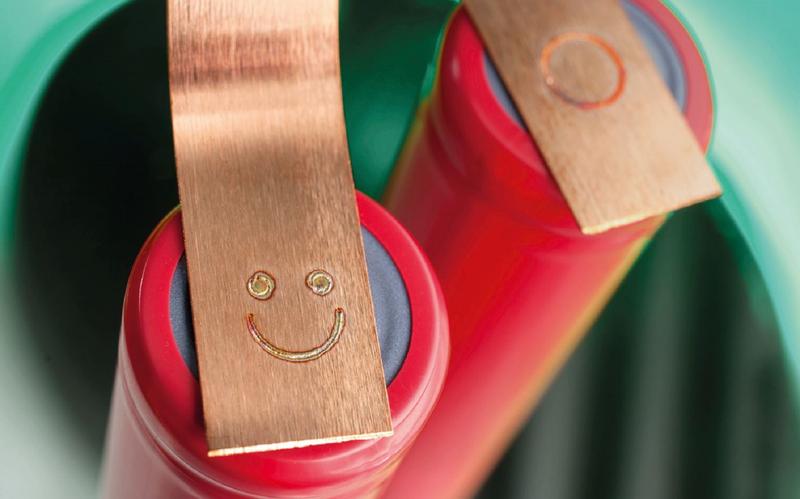

One of the topics at LSE’20: efficient laser joining for contacting batteries.
© Fraunhofer ILT, Aachen, Germany
2020 will be a defining year for electromobility in the global vehicle industry: that’s when the EU’s binding fleet-wide CO2 emission targets come into effect.
This fact is also reflected in the growing interest in events related to the production of electric vehicles and batteries. One such event was Fraunhofer ILT’s first, one-day Laser Symposium on Electromobility, which took place in Aachen in February 2019 and sold out all 60 available spaces.
Two-day symposium will increase exchange of ideas
“We received very positive feedback from many research and industry experts,” reports André Häusler, team leader for micro joining of metallic materials at Fraunhofer ILT.
“But the participants would also have liked to have more opportunities for discussions with other attendees to exchange ideas and share detailed knowledge in the field of process monitoring. That’s why, in 2020, we will host a two-day symposium that also focuses on this topic, and we expect to welcome 100 participants.”
As requested by many participants, the event will begin with a laboratory tour at Fraunhofer ILT on February 12. After an exclusive look at current research projects, there will be 16 talks, for instance on laser processes in battery production, laser sources in electromobility and production systems in laser material processing.
The talks will also shed light on process monitoring, laser manufacturing methods and laser-based treatment and processing of solid-state batteries. The Aachen-based researchers rely on a proven concept: research gets to have its say, but industry practice is stepping back into the spotlight.
Major interest in process monitoring
An interesting dialog is likely to develop, as the symposium will be attended by not only laser manufacturers, but also system suppliers and equipment manufacturers, such as Manz AG in Reutlingen. “This time there will also be some automotive manufacturers in attendance, such as Swiss E-Force One AG, which is building electric trucks,” says Häusler.
There will also be a great need for discussion regarding the new focus topic process monitoring in the production of battery modules, which are currently in high demand. Häusler cites one of the typical dilemmas:
“Manufacturers must ensure that they have securely joined and bonded the cell. It is also important to not weld too deeply during manufacture so as not to damage the cell.” So the joining process must be monitored directly in situ wherever possible.
Trend toward higher charging currents
Fraunhofer ILT will also present a variety of battery designs and explain how they were engineered for optimum joining. “To increase the charging current in the modules, we’re seeing a trend toward larger connector sizes,” notes Häusler, who will be speaking at the event. “So the cross sections of the contacts to be welded must be sized accordingly.”
High-productivity stack manufacturing cuts costs
Manufacturers’ plans to start high-volume production of electric vehicles means that battery production needs to be speed up. That’s what the HoLiB research project (“High-throughput methods in manufacturing of lithium-ion batteries”) is aimed at, which is sponsored by the German Federal Ministry of Education and Research (BMBF).
The goal is to create an automated, fixed-path production line that reduces cycle times by a factor of ten by linking the assembly, stacking and bonding processes. This would bring them to under 100 ms per assembled and stacked electrode, boosting productivity and lowering costs.
Another important topic is the blue diode laser, which has an absorption rate of more than 50 percent in copper alloys, making it more suitable than infrared lasers for joining electrically and thermally conductive contacts. Laserline GmbH, a company based in Mülheim an der Ruhr, will present the current state of this technology. “The blue laser is stimulated by diodes, which gives the user a larger focus diameter,” Häusler explains. “This technology won’t replace single-mode sources, but it paves the way for new applications.”
LSE’20 in Aachen: symposium on the future of electromobility
The second Laser Symposium on Electromobility will take place at Fraunhofer ILT in Aachen on February 12 and 13, 2020. The presentations will be held in German. Early-bird registration is available through December 4, 2019 for 695 euros. After that, the fee goes up to 795 euros.
André Häusler M.Sc.
Group Micro Joining
Telephone +49 241 8906-640
andre.haeusler@ilt.fraunhofer.de
Dr.-Ing. Alexander Olowinsky
Group Manager Micro Joining
Telephone +49 241 8906-491
alexander.olowinsky@ilt.fraunhofer.de












